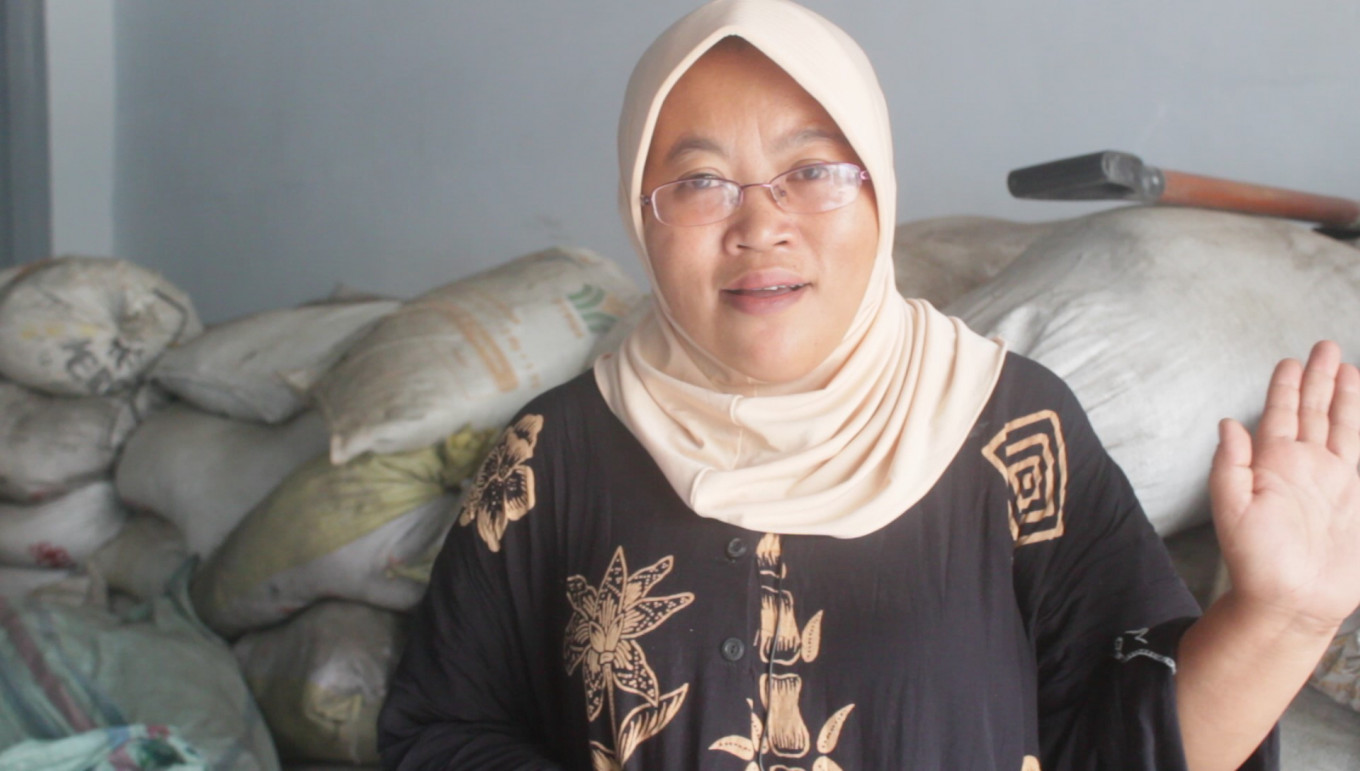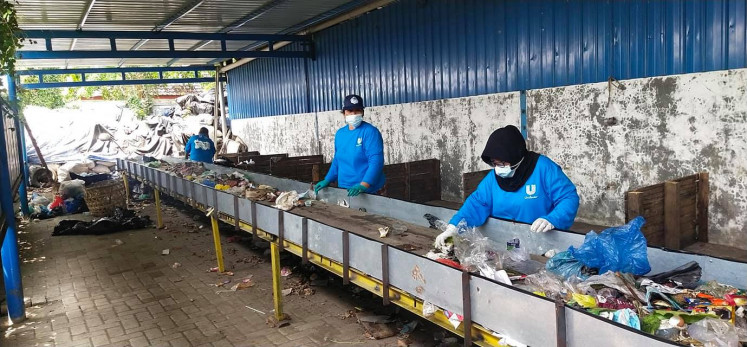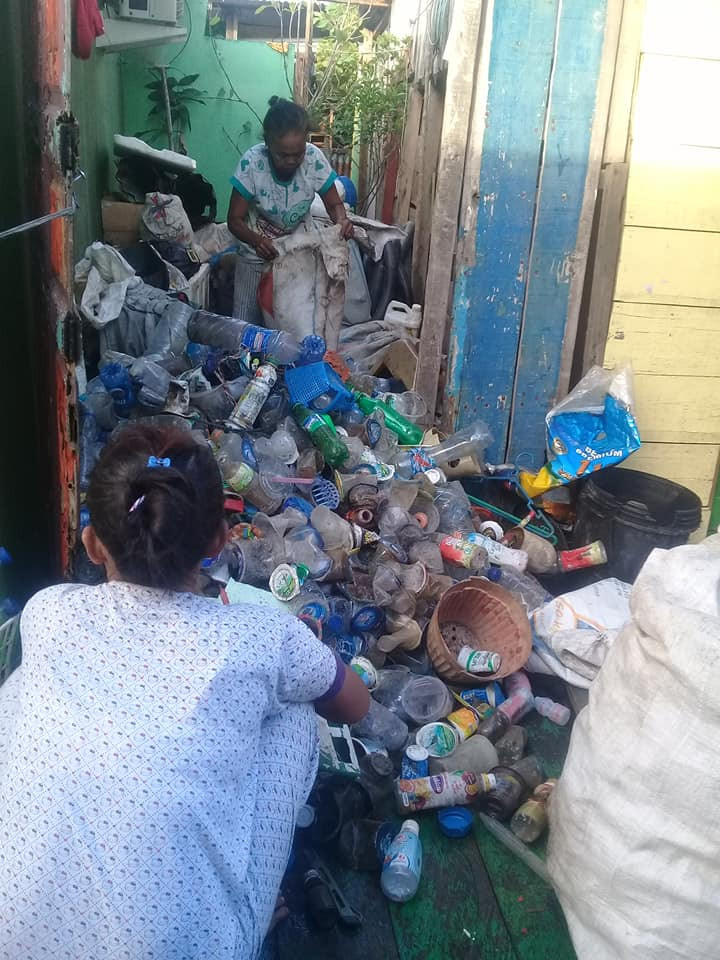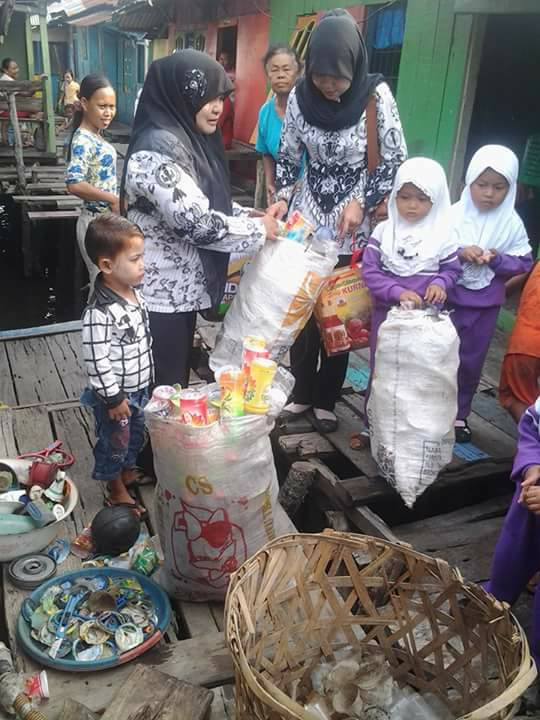Popular Reads
Top Results
Can't find what you're looking for?
View all search resultsPopular Reads
Top Results
Can't find what you're looking for?
View all search resultsThe struggle of waste banks to recycle and repurpose trash
Despite having economic value and being a solution to waste problems, waste banks struggle to find support from the public and the government.
Change text size
Gift Premium Articles
to Anyone
D
espite having economic value and being a solution to waste problems, waste banks struggle to find support from the public and the government.
Last May, after eight years of managing a waste bank in Sicanang, Belawan, Medan, 46-year-old Armawati Chaniago announced on her Facebook account that she would stop the program.
"I decided to stop. But many of my colleagues encouraged me to keep doing it because the goal is important: to save the environment. So I will continue but with changes," the founder and director of Bank Sampah Induk Sicanang told The Jakarta Post, on June 21.
Waste banks are an effective way to reduce the ongoing accumulation of waste. This program can be a solution to overcome the waste problems in big cities, such as Medan, which produces 1,500 to 2,000 tons of waste per day.
If managed well, waste banks also have economic value. But maintaining the sustainability of the operation is not easy. In the past, the Sicanang waste bank, which aims to sort waste from the main landfill site in the area, was run by 24 permanent staff. Now it is only managed by four people.
"I had to [lower the number of workers] to keep this waste bank running," said Armawati.
Previously, the operational costs were too high. The waste bank spent up to Rp 20 million (US$1,351) in personal funds per month.
"That's the reason [we decided] to stop it. The expenditure was much greater than the results," she said.
Data released by the Environment and Forestry Ministry in 2021 showed that out of over 25 million tons of waste per year, about 30 percent (8 million tons) of which are not managed. The ministry also recorded that there were 11,556 waste banks in 363 districts in Indonesia.
Environment and Forestry Ministerial Regulation No. 14 of 2021 does include waste management by waste banks, yet its implementation still faces many challenges.
Waste banks aim to overcome urban problems, but they are usually run independently by communities due to the absence of support from the government. Armawati mentioned that the waste bank she managed was supported by the government in the first two years of running, although not fully. That support did not continue.
“At that time we only received [governmental] support to pay the salaries for the staff every month, but not for daily operations, such as warehouse rent, transportation and office needs,” she said.
“After two years, I don't know exactly why there was no more support from the Medan City government.”
Despite the lack of governmental support, Armawati has continued to run the waste bank program until now, where it successfully manages 16 community groups comprising 46,000 people at 268 points in North Sumatra and two in Aceh.
In one month, these community groups are able to recycle a total of 4.7 tons of waste.
Throughout 2020, the waste bank was able to produce industrial raw materials from 2,600 tons of waste with an economic value of Rp 6.8 billion by recycling only 2 percent of Medan City's waste in a year.
"This means that in addition to efforts to save the environment, waste banks also produce very high economic value," she said.
Doing the work: Several women sort plastic waste, which is a part of the waste bank program in Medan. (Courtesy of Armawati Chaniago) (Courtesy of Armawati Chaniago/Courtesy of Armawati Chaniago)Economic value
Managing a waste bank is not that complicated, but it is difficult to keep it consistent.
“Actually, it is not difficult to run a waste bank. Garbage banks can be implemented anywhere. The important thing to have is motivation,” Armawati said.
“[A waste bank requires at least] five people to work together, determine a consistent collection and weighing schedule and decide how to make the community sustainable in sorting waste and depositing it in the waste bank."
A waste bank team would start by raising community awareness about the economic value of recycling waste and forming a recycling group that usually consists of low-income people living near the landfill site. This is followed by guiding them to sort recyclable waste, such as plastics, and wastes that can be processed into raw materials for compost and methanol.
After assisting community groups to carry out these stages, the waste bank collects the waste that has been sorted, converts it into money, accumulates it and pays the waste sorters regularly.
“The [sorted] waste is not [initially paid for with] cash. It is collected first, converted to cash value and stored and recorded in a savings book. [The money] then can be collected after three months, so that the proceeds can be used, for instance, for children's school fees," she said.
The recyclable waste will then be sold to recycle waste collectors, who then sell it to the processing industry using recycled raw materials, such as for furniture made of plastic.
"On average, the margin produced by a waste bank is only 10 to 30 percent," she said.
Meanwhile, the income for one group of recycling waste sorters from this activity can reach Rp 8 million to Rp 12 million per three months with continuity of once a week on an average of 100 kilograms of recycled waste.
"One person can get Rp 800,000 to Rp 1 million per three months," she said.
Women empowered: Women at Kampung Nelayan, Belawan, Medan, sorted plastic trash before sending them to the waste bank. (Courtesy of Hujrah) (Courtesy of Hujrah/Courtesy of Hujrah)Maintaining consistency
The relatively low economic value means maintaining the sustainability of the waste bank is vulnerable.
Zainab Yusuf, 50, founder of a waste bank in Bagan Deli, Belawan, said that it was still difficult to encourage the public to routinely collect and deposit waste in the waste bank she manages.
“The problem is that even today, people don't want to take part in this waste bank program. I have repeatedly motivated them, [but] only about 60 people bring their waste to the waste bank," said Zainab to the Post, on May 18, 2020.
Zaenab empowers mostly the wives of fishermen. The proceeds from the sorted waste collected by the community are converted into money to pay for their children’s school fees at the early childhood education center (PAUD) she manages, PAUD Putri.
However, the results are not much after the sorted waste is sold to a recycling collector in Bagan Deli village.
“There is only a small amount of plastic, about 60 to 70 kilograms in one month. The results are erratic, sometimes Rp 500,000 to Rp 700,000. [We once received] Rp 800,000. It has also reached more than Rp 1 million. It is uncertain, but [this waste bank] is still running,” she said.
Hujrah, 45, who runs the Samudra Mikail waste bank in Kampung Nelayan, Belawan, also faces a similar challenge: inconsistency. This is because the community's motivation to collect and sort waste so that it has economic value is still low.
She learned that public awareness of environmental pollution due to waste also remains low.
"There are still many people here who throw garbage carelessly," she said.
In a week, the waste bank she manages can collect 150 kilograms of dry waste (cardboard), and 50 to 80 kilograms of plastic waste from 50 people. Its value also can reach between Rp 500,000 to Rp 1 million per month.
"Sometimes it doesn't reach that much, it's uncertain. In the past, the result was Rp 3 million [$ 210] a month," she said.
Keep striving: Hujrah (left), manages a waste bank in a fishermen's settlement in Kampung Nelayan, Medan and is still facing a lot of obstacles, such as the low awareness of waste recycling. (Courtesy of Hujrah) (Courtesy of Hujrah/Courtesy of Hujrah)Political will required
The challenge for waste banks, according to Armawati, was that after training community groups, there was no political will from the government to provide assistance.
"Indeed, even without government support, we can still run. But, it would be even better if the government supports this program," she said.
Government support could include, among other things, providing assistance to the community and providing a stimulus to ensure that waste sorting continues. The government can help provide incentives for waste sorting groups, so they do not only rely on profits from waste banks.
“We know that piles of waste have very high economic value. They can be processed into raw materials for advanced industries, recycling, organic fertilizers and raw energy materials [such as methanol] in the future,” Armawati said.
“Waste will only remain trash if [we] do not have the intention, ability and political will to manage it.”













